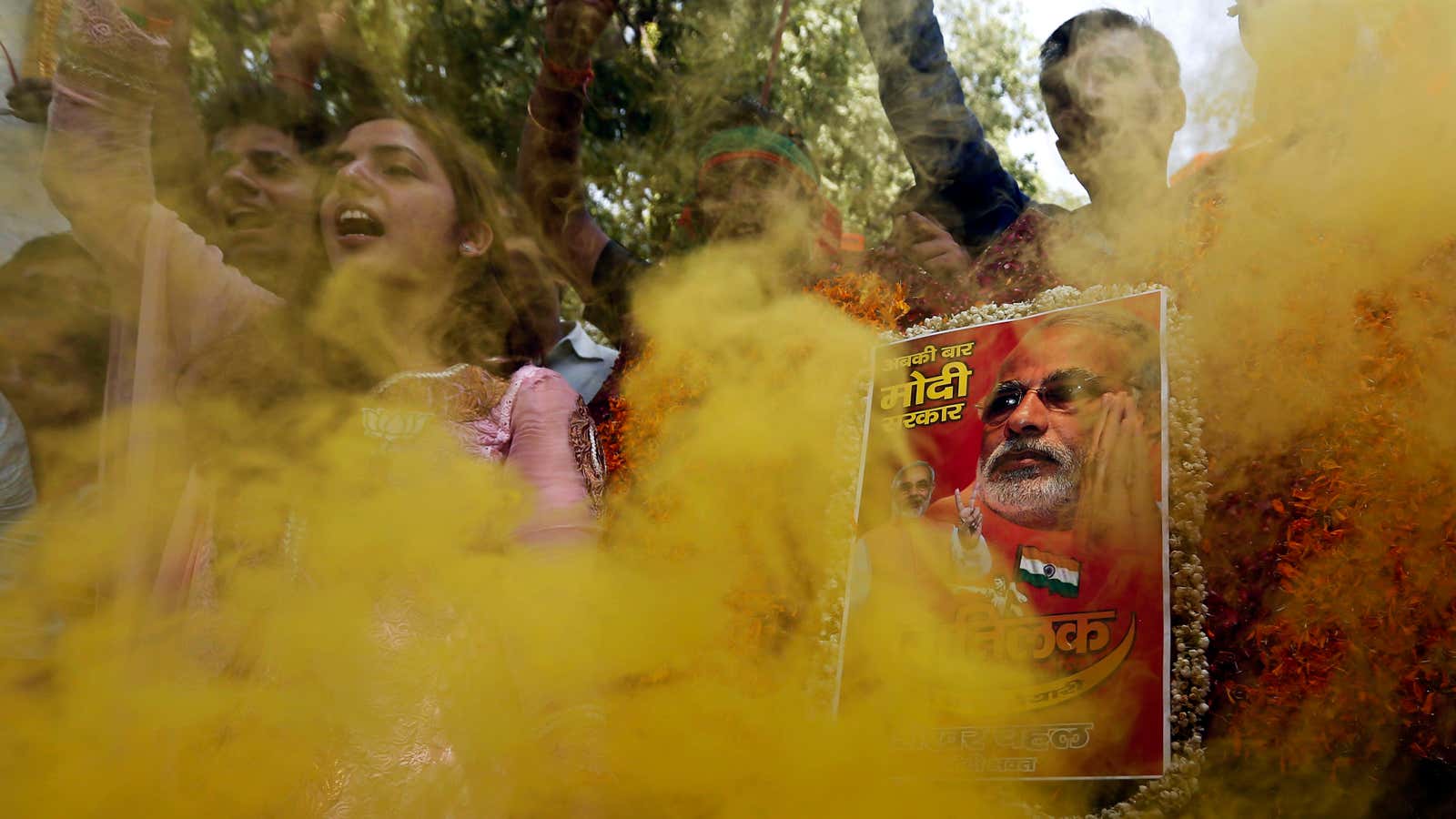Among the best writing on Quartz is essays and reports from writers who aren’t on our staff—some of them regular contributors, some who have written for us only once. We’ve picked a selection of their best pieces, along with a couple of our own staff writers’ pieces.
Narendra Modi and the moral line of no return
Few pieces we published this year attracted as many comments as this one on the eve of India’s general election. Thane Richard argued that the mere possibility that Modi was involved in the Gujarat massacre of 2002, even if unproven, should have been enough to disqualify him as prime minister, and that Indians’ willingness to vote for him represented a disturbing abnegation of moral principles.
Was the Oculus Rift inadvertently designed to be sexist?
Facebook’s $2 billion purchase of Oculus was one of the deals that rocked the tech world this year, and a sign for some that virtual reality (VR) has finally arrived. But danah boyd recalled an old experiment suggesting that VR in its current form may simply not work well for women, in an indictment of the male-centric tech industry.
Lessons from the Isla Vista massacre
Elliot Rodger, a young man who killed six people plus himself in California, left behind a 140-page memoir dripping with hatred of women. Jeff Yang dissected the damning things it says about the US’s culture.
What the heck is happening to the global economy?
Financial crisis… terrorism… a new Cold War… yawning wealth gaps… the anti-democratic backlash… The 21st century isn’t all it cracked up to be. Manuel Hinds explained the uncertainties of the modern era as an unavoidable product of the most wrenching technological changes we’ve seen since electricity, cars, and flight.
Life in the land where there is no touching
Ebola doesn’t just kill people; it gradually, painfully atomizes the society of the survivors. Benno Muchler filed a haunting report from Monrovia, Liberia’s capital.
American parenting is killing the American marriage
Danielle and Astro Teller, already well known for their criticisms of the institution of marriage, set their sights on the religion of parenting, which preaches the dogma that children are the most important thing in life and persecutes heretics with zeal.
The ultimate failure of the new World Trade Center
It’s a building that should have made a statement—that New Yorkers cannot be defeated, that the terrorists can’t win, and that America is more than capable of erecting new achievements for the world to gaze upon. Instead, mused Zachary M. Seward, the city got just another boring structure that fails to make any impact.
It’s time to get over “helicopter parenting”
After moving from Paris to Washington, DC, Emma-Kate Symons was “gobsmacked by the constant demands placed on parents to regularly invade their children’s educational establishment.” For Americans’ benefit, she explains how the French education system lets parents maintain a sensible kid-life balance.
The Uber economy depends on wealth inequality
The internet is commonly hailed as making Uber and other on-demand services possible. But, argued Leo Mirani, really all they require, besides customers, is a class of people willing to work for low pay without job security—a class that was historically large in poor countries, and is growing in the West.
Why China can’t take over the world
In a thumbnail history of the world’s great empires, Noah Smith argued that China has been dominant only for brief periods because its very size makes it prone to frequent rebellions and conflicts with neighbors, and holds back its technological progress and economic development.
Where are the black people on American TV?
Casual observers—or those with short memories—might think American TV is getting more diverse. But Kellie Carter Jackson recalled an age when there were more—and at least, more good-quality—TV shows with all-black casts; paradoxically, in the age of Obama, the most acclaimed shows of recent years are dominated by white characters, and African Americans are relegated to the fringes.
How children’s books can save lives
Only 93 of the 3,200 children’s books published in 2013 in the US had African-American protagonists, and only 67 were written by African Americans. Mathangi Subramanian, reflecting on her own struggle to get a story about a girl with strong female role models published in India, argued that fiction is essential in helping people conceive of a better future than the one society tells them they’re destined to have.
One refugee’s journey from Syria to Europe—and back
Caitlin Hu recounts the story of Juan Sheikh Muslim, a Kurdish Syrian who fled Kobani (Ayn al-Arab) in northern Syria and paid smugglers all his savings to get to Spain. Two years later, he paid them again to get him back to the Turkey-Syria border, to help his compatriots fleeing the fighting.




